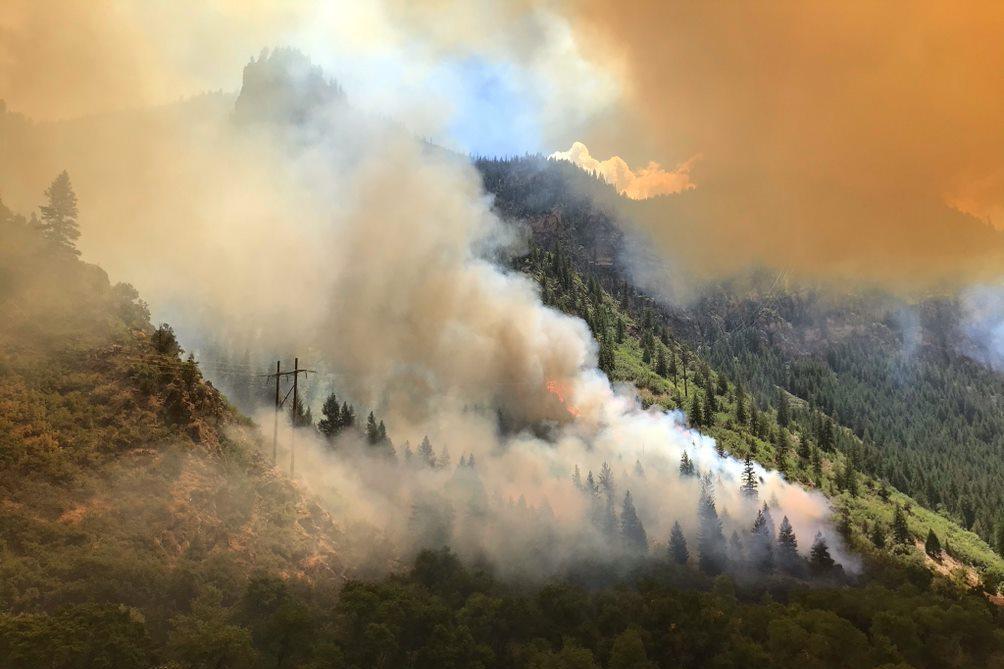
Updated Aug. 20
At a press conference on Thursday, Aug. 20, Colorado Department of Transportation executive director Shoshana Lew said they are looking at "days, not weeks" to reopen Interstate 70 at Glenwood Canyon.
Drivers should still be wary of the route even after the Grizzly Creek fire is out, though.
Our original story continues below.
Flames alongside Interstate 70 through Glenwood Canyon mean there’s still no timetable for when the ever-so-important roadway will reopen.
The east-west thoroughfare’s closure because of the Grizzly Creek Fire has caused transportation havoc in recent days, with commercial trucks getting stuck on alternative routes and Google Maps routing thousands of drivers down 4x4 dirt trails.
Gov. Jared Polis had said Friday morning at a press conference in Eagle that a best-case scenario for reopening would be two or three days.
“It’s really a question of when it’s no longer right on the highway,” Polis said, according to the Vail Daily.
But Colorado Department of Transportation spokesman Matt Inzeo said, because of the fire’s proximity, there’s no timetable for reopening the highway.
“Once that clears, we will need to assess structures and clear some rock fall that has occurred,” Inzeo wrote in a text message.
The Grizzly Creek Fire, which doubled in size overnight, has added to the stresses Glenwood Springs and the Roaring Fork Valley have experienced this summer — first due to the coronavirus pandemic and now a natural disaster.
(The agency announced late Friday that Independence Pass on the southern edge of the valley has reopened to passenger vehicles only.)
Grocery store shelves that were already sparse because of the pandemic are now empty, said Kellie Smith who lives near El Jebel. It's been impossible to find items like soy sauce and certain cleaning products for weeks at her local City Market. But now even staples like meat, frozen vegetables and canned tomatoes are gone.
"We currently have completely bare shelves in areas," Smith said.
She's adjusted her menu planning and is going to try a grocery store further down valley. Jessica Trowbridge, a spokeswoman for City Market, said the company is redirecting trucks and is anticipating a six-to-eight hour delay in deliveries.
"Our teams are working diligently to get products to all impacted stores as quickly as possible," she wrote in an email.
In Glenwood Springs, April Chiarell has had a hard time finding food for her daughter’s salamander Tiger.
“Petco can’t get their crickets, and said it’s creating a shortage on our side of the mountain,” Chiarell wrote in a message.
I-70’s closure has created problems for other essentials like fuel and, yes, booze
Most fuel comes from the Denver area, said Grier Bailey, executive director of the Colorado Wyoming Petroleum Marketers Association. Many tanker trucks now are making a 700-mile round-trip journey from Denver south through Gunnison and up to the valley, he said.
"It's not the first time a fire has happened. The industry is resilient," Bailey said. "Emergency services are still getting fuel and stations are certainly running low, but I don't think they are quote-unquote running out right now."
Those extra miles tankers must travel are straining the system, Bailey said, especially federal limits on drivers' hour of service. Bailey expects deliveries can continue to operate in this way for another week or so. If need be, he said, it's possible deliveries could be made from refineries in Sinclair, Wyoming, and via a rail line from Denver.
Liquor stores in the valley have had trouble getting product delivered for months. The shelves at Jimbo’s Liquors in Basalt are a “fruit salad,” said manager Edward Campbell, because they aren’t sure what they’ll be able to get in.
It’s been particularly hard to stock big-name Mexican beers like Modelo and Corona after the government there temporarily shut down breweries earlier this year, Campbell said. The store now sells a wide variety of Mexican lagers from Colorado breweries because they’re easier to stock.
“We've really diversified our portfolio and gotten a lot of cool stuff that we would've never had beforehand,” he said.
The fire and Interstate 70’s closure means Campell will have to rely on smaller breweries and distributors even more, he said. The store’s main distributor, Mountain Beverage in Gypsum, is on the east side of Glenwood Canyon. They’re suspending deliveries indefinitely because the long detour north through Steamboat Springs is unsustainable.
“We just can’t continue to do it,” said Cindy Hosman, controller for Mountain Beverage.
The company is looking for warehouse space in Rifle, on the west side of the closure. Drivers would be put up in hotels for the week and make deliveries from there, Hosman said.
"This is definitely going to cost us money and time to do this,” she said. “But if it's a long-term closure of I-70, we have to look at how we can make it work."
A less remote alternative to Glenwood Canyon, Cottonwood Pass, was closed earlier this week when too many cars and some trucks got stuck on its winding path. Upgrading that would cost $66 million, according to a 2010 study.
"$66 million is a lot of money,” Hosman said. “But right now, the impact to the economy and people on both sides of the canyon, and people who are just trying to go through, is far greater than that."
Beyond the money though, such a project would have an environmental cost too.








